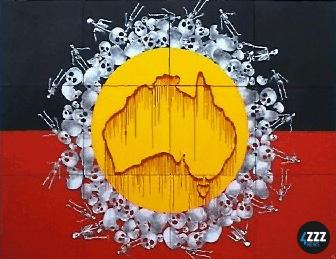
On Sunday January 21, 2018, WARCollective: Warriors for the Aboriginal Resistance, held a Black GST Public Forum, which was part of the Seven Days of Resistance (leading to the January 26 nationwide protests). Long-time Indigenous activists Tony Birch; Margi Thorpe; Robbie Thorpe; and non-Indigenous ally Clare Land talked Genocide, Sovereignty and Treaty. The conversation covered human rights violations against Indigenous peoples in Australia, protest, reconciliation, consent, the Constitution, and Indigenous resistance — from 1770 to the present day (including January 26).
Australia Day makes me sad. If our nation is so insecure that our national day can’t be a time to reflect on what it means to be Australian, but can only be a time to ‘feel proud to be Australian’, then that’s a level of self-doubt and immaturity of stratospheric proportions. An event in 2009 sums this up for me.
While living in Timor-Leste we’d somehow ended up snorkelling, a little way out of Dili, with a group that included the Australian Ambassador. It was mid January. While we all ate lunch in the shade of a huge palm, the Ambassador spoke about the Embassy’s Australia Day event, and how it wasn’t finalised yet, but he was thinking of something similar to last year.* I asked if he had a date in mind. (I thought that’d be funny.) The Australians in the group looked like I’d just killed their puppy. I was taken aback, it was clear that my innocent joke wasn’t appreciated. I’d not encountered such a defence of the day before.
Australia Day is asked to do a lot of heavy lifting, but its origins means it will never represent everyone; and when you think about it, no one ‘national day of anything’ can. In contrast, Timor-Leste has numerous national days that reflect different aspects itself. There’s Proclamation of Independence Day (November 28) — when it declared independence from Portugal; Popular Consultation Day (August 30) — when the Constituent Assembly was elected; Restoration of Independence Day (May 20) — when Timor-Leste’s Constitution came into force and the nation was recognised by the UN; and National Heroes Day (December 7) — the day Indonesia invaded. (There’s a few more.) There’s no doubting Timorese people are proud, but they don’t place sole weight and responsibility for honouring their entire nation on one day.
The ‘Australia Day’ of today clearly doesn’t unite us — not least because it’s a form of compulsory militarised nationalism (that includes Anzac Day) initiated and politicised by Hawke and Keating; ramped up by Howard; and continued by the rest. [Jeff Sparrow on the militarisation of Australian nationalism]. Think of Australia running down a hill, at the moment our legs are speeding up, with a mind of their own; our knees are all over the shop; and our arms are flailing. We trip over our own legs, lurch forward, thrust our arms out in front of us to brace for the inevitable, yet we still face plant the dirt. That’s where this current type of nationalism will get us.
The Black GST contends that three fundamental legal issues must be resolved for the holistic wellbeing of Indigenous peoples to be achieved, and for Australia to gain honour as a nation: (1) Genocide to be stopped; (2) Sovereignty to be acknowledged; (3) Treaties to be made. It draws on centuries of resistance, protest and agitation, including the Frontier Wars (e.g. Yunnerminnerwait & Maulboyheenner; Jandamarra; Woollarawarre Bennelong); the National Day of Mourning (January 26, 1938); the establishment of the Aboriginal Tent Embassy (January 26, 1972); the 1982 Stolenwealth Games protests in Meanjin (Brisbane); the 1988 Bicentennial protests everywhere; the fight for Land Rights, everywhere; the fight for reparations for the Stolen Generations (Bringing them Home: The ‘Stolen Children’ report, 1997), everywhere; the fight for the implementation of the recommendations from the Royal Commission into Indigenous Deaths in Custody (1987–1991), everywhere; the 2006 Stolenwealth Games protests in Naarm (Melbourne); and the 2018 Stolenwealth Games protests on Kombumerri Country (Gold Coast).
This audio piece is an edited excerpt of what Robbie Thorpe had to say on January 21, 2018. At times he’s confrontational, and while it’s only one person’s view, Robbie tells it the way he sees it, and we love him for that. The music is ‘Spirit’ by bangarra dance company. Rounding out the piece is Alice Ether’s ‘My Story is Your Story’. Note: this audio contains the voice of a deceased person.
*We lived in Timore-Leste for three years, and in that time we did not attend one Australia Day event. Each year it was a BBQ on the beach with Australian flags, beer and cricket. Individually all these things are fine, but I found that this particular brand of hefty nationalism made me feel out of place, and strangely nostalgic for 1993.